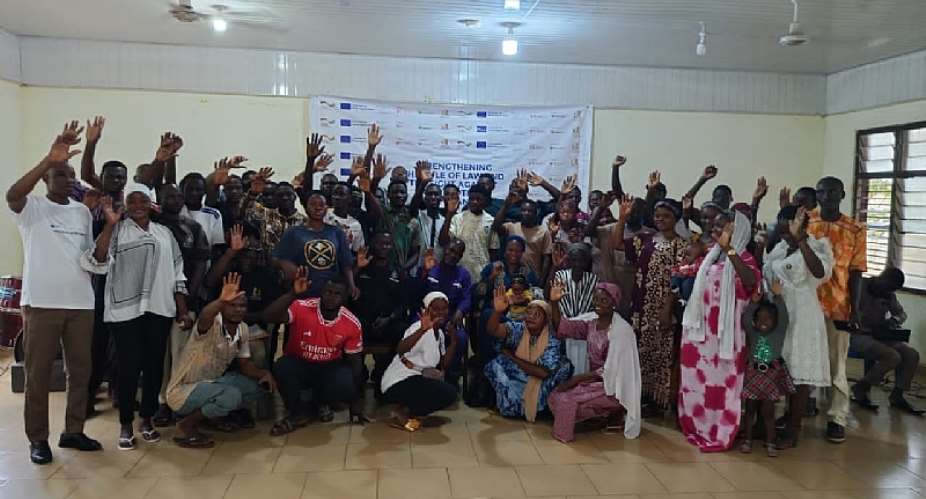The Municipal Directorate of the National Commission for Civic Education (NCCE) has organized a Town Hall Engagement for out-of-school youth in the Gushegu Municipality in the Northern Region on the theme "The Rule of Law and the Fight Against Corruption."
The event was organized by NCCE and sponsored by the German Development Cooperation (GIZ), co-funded by the European Union, with support from the Ministry of Finance.
Participants were drawn from various suburbs of Gushegu, including Kunnaayili, Gariche-Fong, Lalgu, Limam-Fong, Nakohigu-Fong, and Yishelan-yili. Other participants included Persons Living with Disabilities (PLWDs), representatives from the Growing Project, women's groups, and CAMA, an association of out-of-school young girls.
The engagement aimed to empower young people with practical knowledge on the rule of law, civic rights, the Whistleblower Act, and the role of the youth in promoting transparency and accountability.
The Municipal Director of NCCE, Awal Abdul Mugis, stated that the awareness creation forms part of the broader "Civic Engagement on the Rule of Law and the Fight Against Corruption" project.
He emphasized that many out-of-school youth—who are crucial actors in Ghana’s anti-corruption and governance landscape—often work as artisans, traders, apprentices, or are unemployed. Due to their frequent interaction with public systems and officials, and limited access to civic education, they have become more vulnerable to corrupt practices and unaware of legal protections and accountability mechanisms.
Mr. Mugis noted that this engagement is intended to provide a platform for participants to share their experiences regarding corruption and the Whistleblower Act in their communities. He urged participants to unite, understand their civic rights, and report corruption at the community level.
He also stressed the importance of mutual support in promoting rule of law principles, understanding corruption, anti-corruption laws, and reporting wrongdoing. He expressed gratitude to participants for their turnout and encouraged them to actively participate in the session.
The Municipal Director of the Commission on Human Rights and Administrative Justice (CHRAJ), Mohammed Jafar, also engaged participants in an interactive session. He educated them on the meaning of corruption, its causes, effects, and strategies for fighting it.
He defined corruption as the misuse of entrusted power and explained that it is not limited to political or institutional settings but is present in communities and even within households.
Through discussions and brainstorming, participants explored definitions, causes, and the impacts of corruption. Mr. Jafar identified causes such as poor accountability, weak institutions, lack of law enforcement, cultural norms, and inadequate legal frameworks.
He explained that misusing government authority also constitutes corruption. He outlined common forms of corruption including bribery, extortion, embezzlement, fraud, favoritism, state capture, influence peddling, and abuse of office.
Mr. Jafar highlighted that the effects of corruption include the undermining of economic growth, distorted national priorities, loss of resources, weakening of democratic institutions, erosion of public trust, manipulation of public policies, and worsening of poverty levels.
He stressed that the fight against corruption requires a multifaceted approach. This includes strengthening laws and institutions, and educating the public about the consequences of corruption and available avenues for reporting it. He stated that historically, penalties and punishment have been the primary tools in fighting corruption.
He called on traditional leaders, religious figures, youth groups, and opinion leaders to wake up from their slumber and take a strong stand against corruption, which he noted has deeply affected the Ghanaian society.
Lance Corporal Daniel Ediemu from the Gushegu Municipal Police Service led a session focused on the Whistleblower Act. He explained the purpose of the Act, which is to encourage individuals to report corrupt activities, provide legal protection for whistleblowers, and promote transparency and accountability in both public and private institutions.
He encouraged the youth to be courageous and informed about their civic duty to report corruption, assuring them that the law is designed to protect those who choose to speak up.

_
Follow us on our social media pages for more stories and posts from the NCCE.
https://www.instagram.com/nccegh1/
https://www.facebook.com/nccegh/


Leave a comment